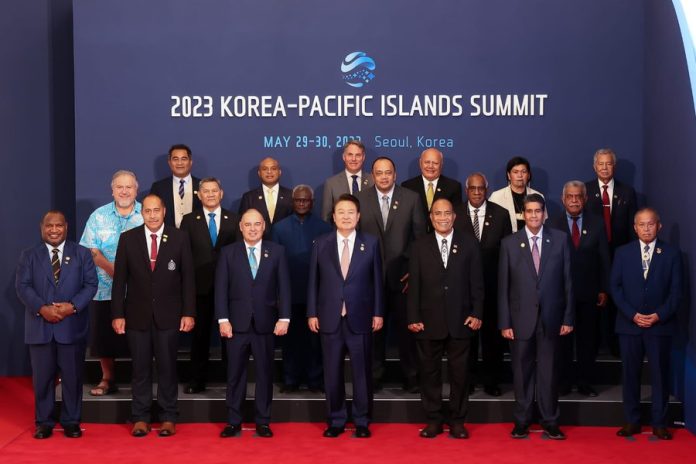By Pita Ligaiula in Seoul
The Korea – Pacific Islands Summit shares the view that the Democratic People’s Republic of Korea’s (DPRK) nuclear and missile programmes are a direct and serious threat to international peace and security.
In the 2023 Korea-Pacific Islands Leaders’ Declaration issued after Monday’s Summit the Leaders emphasised that denuclearsation of the DPRK is essential for a peaceful region and urged the DPRK to immediately return to negotiations.
“The Pacific Islands Forum Leaders expressed their continued support for Korea’s ‘Audacious Initiative’ for a denuclearised, peaceful and prosperous Korean Peninsula”
“Noting that peace and stability in the Pacific region are interlinked with global peace and stability, the Leaders acknowledge the need to strengthen development cooperation and security collaboration including maritime security, climate security, energy security, cyber security, human security, public health and transnational security,” the declaration said.
The Leaders reaffirmed their shared views on keeping the ocean and maritime resources free of environmental pollution by radioactive wastes and other radioactive matter.
“In this regard, the Leaders stressed the importance of ensuring international consultations, international law, and independent and verifiable scientific assessment to protect and preserve the maritime waters and resources.
The Leaders also underlined their grave concern over the continuing threat of nuclear weapons proliferation and its risk to the peace and security of the planet; and stressed that the total elimination of nuclear weapons remains the shared goal.
“We affirm unity in our continued commitment to the cornerstone Treaty on the Non-Proliferation of Nuclear Weapons and recognise the valuable contribution by the South Pacific Nuclear Free Zone Treaty, toward our goal of a world without nuclear weapons,” the declaration stated.
The Leaders also reiterated their firm commitment to international law, including the 1982 UN Convention on the Law of the Sea (UNCLOS).
“The Leaders will work together to protect and preserve the marine environment, promote maritime security and safety, and the lawful and sustainable use of the seas, and to enhance the capacity to prevent, deter and eliminate Illegal, Unreported and Unregulated (IUU) fishing in the region.
“To this end, the Leaders recognised the sovereign rights of Pacific Island Countries to implement zone-based measures to ensure the sustainable management of fisheries within their Exclusive Economic Zones in accordance with international law.
“Korea supports the 2021 PIF Declaration on Preserving Maritime Zones in the face of Climate Change-related Sea-Level Rise, which proclaims that maritime zones, established in accordance with the 1982 UNCLOS, and the rights and entitlements that flow from them, shall continue to apply, without reduction, notwithstanding any physical changes connected to climate change-related sea-level rise,” the declaration stated.
The Leaders will work together to strengthen cybersecurity cooperation to build an open, secure, stable, accessible and peaceful cyberspace, and to support the development of digital connectivity, education and the digital economy in the region.
The Leaders agreed Monday to expand cooperation in diverse areas, including the response to the climate crisis and economic development.
The two sides also adopted a joint leaders’ declaration which called to strengthen cooperation between the 2050 Strategy for the Blue Pacific Continent, the PIF’s long-term development strategy, and Korea’s Indo-Pacific strategy “as key partners to effectively address global challenges and co-prosper”
South Korea’s pledge to double its official development assistance (ODA) for Pacific Island nations to US$39.9 million by 2027, and to strengthen efforts to provide financial, technological and other assistance in responding to climate change.
The Pacific Island nations welcomed South Korea’s bid to host the 2030 World Expo in its southeastern city of Busan.
South Korea unveiled its own action plan for relations with Pacific Island nations under the three pillars of resilience, reinforcement and revitalisation.
Resilience centres on enhancing cooperation against the climate crisis and improving Pacific Island nations’ ability to recover from climate-induced disasters.
Under revitalisation, the goal is to boost the connectivity of Pacific Island nations in the post-pandemic era by increasing people-to-people, digital and material exchanges.
The leaders also reaffirmed their countries’ agreement to shorten the cycle of their foreign ministerial talks to every two years and to hold the next summit at a mutually agreed time and place.
SOURCE: PACNEWS














